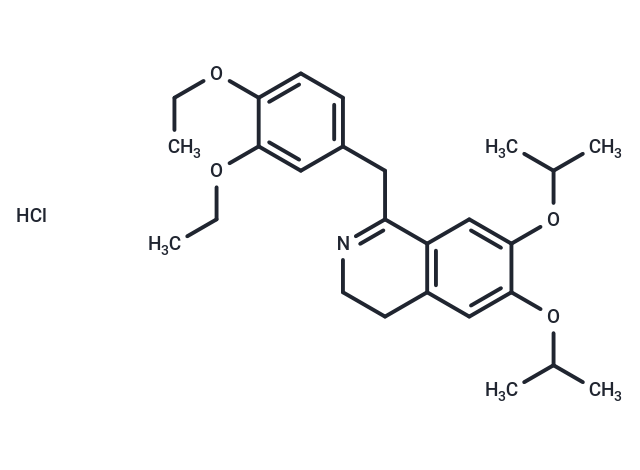Shopping Cart
- Remove All
 Your shopping cart is currently empty
Your shopping cart is currently empty

Diproteverine HCl is a novel calcium antagonist with antianginal properties, antispasmodic and vasoactive.

| Pack Size | Price | Availability | Quantity |
|---|---|---|---|
| 1 mg | $117 | In Stock | |
| 5 mg | $258 | In Stock | |
| 10 mg | $382 | In Stock | |
| 25 mg | $592 | In Stock |
| Description | Diproteverine HCl is a novel calcium antagonist with antianginal properties, antispasmodic and vasoactive. |
| In vitro | Diproteverine (1 μM; sheep Purkinje fibers) to reduce the amplitude of the slow action potential (IC30 = 2 μM) and to shorten the duration of the fast action potential at 50% repolarisation (IC30 = 2.5 μM). Papaverine was found to possess marginal membrane channel-blocking activity and to be much more potent than diproteverine as a cAMP-phosphodiesterase inhibitor (IC50 = 8 μM).[2] |
| In vivo | Diproteverine (0.25-0.75 mg/kg; i.e.; dog; at plasma levels within the assumed therapeutic range) dose-relatedly decreases heart rate, increases corrected sinus node recovery time, and decreases Wenckebach point. These effects are observed at plasma levels ranging between 16.2 +/- 4.1 and 144.7 +/- 12.5 ng/ml. After cholinergic blockade with N-methylscopolammonium, diproteverine lowers heart rate (greater than or equal to 0.25 mg/kg), increases corrected sinus node recovery time, and decreases Wenckebach point (greater than or equal to 0.5 mg/kg). After propranolol, diproteverine only significantly reduces corrected sinus node recovery time 5 min after the third administration (0.75 mg/kg). After pharmacologic autonomic blockade by N-methylscopolammonium propranolol combination, diproteverine lowers the intrinsic heart rate (greater than or equal to 0.25 mg/kg) and Wenckebach point (greater than or equal to 0.5 mg/kg). Diproteverine does not modify mean blood pressure. These results show that diproteverine administered with and without pharmacologic autonomic blockade in the conscious dog causes dose-related depressant effects on sinus node function and atrioventricular conduction without producing significant vasodilatation.[1] |
| Molecular Weight | 462.02 |
| Formula | C26H36ClNO4 |
| Cas No. | 69373-88-2 |
| Smiles | Cl.N1=C(C=2C=C(OC(C)C)C(OC(C)C)=CC2CC1)CC3=CC=C(OCC)C(OCC)=C3 |
| Storage | Powder: -20°C for 3 years | In solvent: -80°C for 1 year | Shipping with blue ice. | |||||||||||||||||||||||||||||||||||
| Solubility Information | DMSO: 55 mg/mL (119.04 mM), Sonication is recommended. | |||||||||||||||||||||||||||||||||||
Solution Preparation Table | ||||||||||||||||||||||||||||||||||||
DMSO
| ||||||||||||||||||||||||||||||||||||

Copyright © 2015-2025 TargetMol Chemicals Inc. All Rights Reserved.